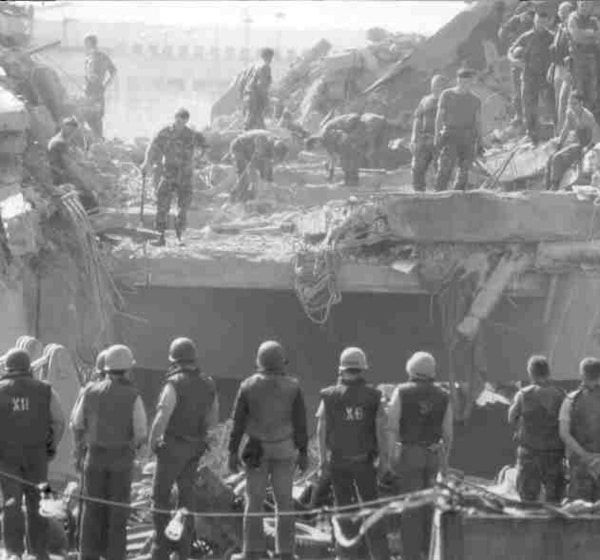US courts say Iran owes terrorism victims billions. That’s an obstacle to a new Iran nuclear deal.
By Christopher A. Bidwell | August 3, 2021
 Rescue and clean-up crews search for casualties following the barracks bombing in Beirut on October 23, 1983. If negotiators hope to revive the Iran nuclear deal, they must address the billions of dollars’ worth of civil judgments by US victims of terrorism against Iran, according to Christopher Bidwell. Photo credit: United States Marine Corps. Public domain image.
Rescue and clean-up crews search for casualties following the barracks bombing in Beirut on October 23, 1983. If negotiators hope to revive the Iran nuclear deal, they must address the billions of dollars’ worth of civil judgments by US victims of terrorism against Iran, according to Christopher Bidwell. Photo credit: United States Marine Corps. Public domain image.
If negotiators hope to revive the Joint Comprehensive Plan of Action (JCPOA), known informally as the Iran nuclear deal, they must address the billions of dollars’ worth of civil judgments by US victims of terrorism against Iran. Failure to do so would disincentivize Iran from limiting or reversing its nuclear ambitions—out of concern that it would never receive meaningful economic gains in return.
US civil judgments against Iran have been growing steadily—both in raw numbers and award sizes—ever since the passage of the Antiterrorism and Effective Death Penalty Act of 1996. The act allows US victims of terrorist actions to sue (for monetary compensation) governments on the State Department’s list of State Sponsors of Terrorism—a list Iran has been on since 1984. The act broadened the scope of the 1976 Foreign Sovereign Immunities Act by creating an exception to the international legal norm that provides sovereign governments immunity from civil actions brought by other nations. The 1996 act spawned multiple billion-dollar lawsuits and corresponding civil judgment awards against Iran due to its support for terrorist activities.
Iran is understandably skeptical about receiving economic relief from the United States and its allies, given that US unilateral economic sanctions related to Iran’s ballistic missile program, human rights violations, and support for terrorist proxies remained in force after the 2015 JCPOA agreement. As with the nuclear sanctions, these additional US sanctions had an extraterritorial effect on non-US banks and companies. Consequently, Iran received only nominal sanctions relief—not the substantive, long-term foreign investments necessary to grow its economy. Even those modest gains were pared back when President Trump withdrew from the JCPOA in 2018. Meanwhile, non-US investors and banks hesitated to do business with Iran for several reasons, including the estimated $56 billion (as of 2016) in outstanding terrorism lawsuit judgments and associated judgment liens (legal claims on property to satisfy a debt) awarded to individuals in US courts against Iran. Since then, US courts have awarded additional billion-dollar judgments, including $6 billion in 2018 in a case related to Iranian support of al-Qaeda.
Holders of US civil judgment liens do not always succeed in acquiring the targeted assets of defendants such as Iran. Nonetheless, the existence of such liens may deter companies with legitimate concerns about their reputations or abilities to get paid. For example, after the 2015 JCPOA agreement, an Iranian airline placed a much-touted, high-profile order to purchase several 737 Max passenger jets from Boeing. The deal stalled due to concerns that judgment holders might attach liens on payments by Iranian entities to Boeing or might confiscate the planes before they would be released to Iran.
Diplomatic agreements between the United States and Iran cannot magically erase or settle these judgment liens. When previous administrations have attempted to intercede in US court cases by claiming executive privilege or sole authority to negotiate agreements with foreign countries, they have been rebuffed. Furthermore, plaintiffs in these cases understandably elicit sympathy. They are often injured military service members or families of dead service members who suffered from Iranian-sponsored terrorist acts such as the 1983 Marine barracks bombing in Lebanon and more recently its furnishing of improvised explosive devices to terrorists in Iraq and Afghanistan. American families of innocent civilians and individuals who were killed or severely injured in Iranian-sponsored terrorist attacks also hold a significant percentage of these judgments. Politicians and senior US officials could face significant backlash if they interfered with judgment award collections or attempted to satisfy these claims with US tax dollars.
The concern about these judgments is more than theoretical. In 2003, Libya’s Miramar Qaddafi decided that Libya would drop its ambition to obtain weapons of mass destruction, cease violating human rights, and stop supporting terrorist groups—ironically the same set of policy objectives the United States now seeks with Iran. Then, as now, businesses, banks, and investors wanted clarity regarding outstanding US civil judgments before entering the Libyan market. At the time, the total value of outstanding judgments against Libya for incidents such as the bombings of Pan Am Flight 103 and UTA Fight 772 and the LaBelle disco bombing was less than $10 billion dollars. Even though the United States took Libya off the list of State Sponsors of Terrorism in 2006, the Libyans claimed in 2008 that they still had not received promised economic relief due to businesses’ concerns over outstanding judgments. Later in 2008, Libya and the United States signed a comprehensive settlement wherein Libya would contribute $1.5 billion to a fund from which all existing judgment claims against Libya could be satisfied. The key difference between the Iranian and Libyan scenarios is the magnitude of the Iranian claims’ pool.
For the JCPOA or any new deal to succeed, the United States will need to articulate a path forward that addresses these outstanding claims. If not, Iran may grow frustrated with another negotiation that fails to provide substantive economic relief, including all of the uncertainty that that implies.
Given the tens of billions of dollars in liens against Iran, the United States may not be able to propose a solution that satisfies all of the judgments in one fell swoop. It might, however, propose that Iran pay a percentage of the proceeds from expanded energy royalties over the course of a five- or ten-year period, after which Iran could come off the list of State Sponsors of Terrorism. This approach would establish a probationary period in which Iran’s commitment to the deal could be measured. The fund could be overseen by a special master—an official appointed by a judge to ensure that a court order is followed—who could settle the claims of victims and their families. Under these circumstances, reluctant non-US and US banks and investors might be reassured about doing business with Iran. Also, Iran might be reassured that its economy could grow, which would provide an incentive to sustain a nuclear deal. In such a case, Iran’s terrorism victims would gain partial closure and its nuclear ambitions would be limited or reversed.
Together, we make the world safer.
The Bulletin elevates expert voices above the noise. But as an independent nonprofit organization, our operations depend on the support of readers like you. Help us continue to deliver quality journalism that holds leaders accountable. Your support of our work at any level is important. In return, we promise our coverage will be understandable, influential, vigilant, solution-oriented, and fair-minded. Together we can make a difference.
Keywords: Iran, Iran nuclear deal, Iran sanctions, United States, arms negotiations, negotiation, nuclear risk
Topics: Nuclear Risk, Nuclear Weapons, Opinion
















This could’ve all gotten avoided had the CIA not overthrown Mohammed Mossadegh in 1953.
Exactly! So, the question should be the other way around. How much does the US owe Iran?
I’ve depended on BotAS for a long time but your article US courts: Iran owes terrorism victims is really a bit much. The author Christopher Bidwell is/was a National Security Counselor at the US Department of Defense. Could this be a conflict of interest? He fails to mention that just a year and a half after the US assassinated Iranian Major General Qasem Soleiunabu. And then you publish a whiney article about the billions of loss that Americans have suffered. mmm He didn’t note the 1953 US overthrow of the elected president Mohammad Mosaddegh nor the many years of hardship Iranians suffered under the brutal US installed Shah. I… Read more »
These lawsuits against “Iranian terrrorism” were an example of the worst type of extortion and misuse of the judicial system, and the Federal judges that entertained them should have been chastised if not impeached.
Every time I read news like this, for a second, I think it might be a joke. So how much should the United States pay for the coup and/or military intervention in Iran and dozens of other countries in Latin America, Africa and Asia, the invasion of Iraq under false arguments, the “collateral” damage in Vietnam, Iraq, Afghanistan, Syria and so on?
This is just another way to block completion of the JCPOA – a cynical, dumb move by the Biden Administration. More and more it looks like there will be no agreement as both this and the past administrations have no intention of lifting sanctions. An ostrich apporach.It will backfire on Washington. A shame, a genuine opportunity to normalize relations with Iran, which would help dampen down tensions throughout the Middle East is being squandered. Cheers, R. Prince/Denver
Nothing about the U.S. Navy shooting down an Iranian airliner.
Was this written by some political hack?
A Trump stooge, maybe.
Very one- sided.
I found myself thinking of the FBI definition of terrorism, and its current exemplars the settlers in the Occupied Territories of Palestine, and the way they are supported by interested parties in the United States, thus being a prime example of international state-sponsored terrorism. Then I wonder how much the United States government owes the Palestinians, and how long it will take to settle those claims – if Uncle Sam has the moral courage to face them. I keep getting news on Uncle Sam having the cowardice of his convictions … Not to forget, the CIA invention in Iran in… Read more »
I really don’t wish to read Imperialist CIA talking points in the Bulletin of Atomic Scientists. I read the Bulletin for a non-biased, objective fact-based view, not polemics and self-interested disingenuous rhetoric. Iran has done more to prevent and neutralise Islamic extremism in the region than any other nation, to my knowledge. To say Iran is a supporter of Al Qaeda, which is Iran’s sectarian opposite, is very unlikely. Similarly Isis is another Sunni group to which Iran did more to neutralise than any other nation. Then the US military comes in and assassinates the Iranian leader most responsible for… Read more »
Iran has cases against the US for arming Saddamwith chemical weapons and helping him gas 100,000 Iranians Iranian relarives of Iran Air 655 tried to sue in US courts and had their case tossed as the judges ruled that even if the shooting had been intnentional the US enjoyed sovereign immunity and can’t be sued while Iran can be flseley accused abd sued in US courts. These were all default judgments obtained against Iran illegally and against intl law which is why these judgments cant be enforced in other countries.
The US armed Saddam with chemical weapons and helped him gas 100,000 Iranians during the Iran-Iraq War 1980-1988. Iran has plenty to sue for too. All these judgments against Iran in US courts were all default judgments obtained against Iran illegally and in violation of international law which is why European countries have refused to acknowledge the judgments including the UK. While the US has unilaterally stripped Iran of sovereign immunity to allow such cases (which are never proven since there’s no opposing party present in court, since no foreign country would waive its sovereign immunity to defend the case… Read more »